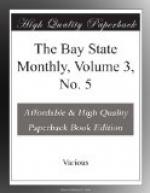JOHN NORTON.
Springfield, Jan. 25, 1748.
[ENDORSED]
In the House of Representatives, Feb,
23, 1748. Read and Ordered that
the sum of L37, 10s. be allowed the memorialist
in consideration of this
officiating as Chaplain to the Prisoners
whilst in captivity at Canada.
In council read & concurred W. Hutchinson,
Speaker
J. Willard
Sec’y
Consented to
W. SHIRLEY.
* * * * *
THE MORMON CHURCH.
By Victoria Reed.
On the 24th of July, 1847, Brigham Young and a few followers pitched their tents at the base of the Wasatch Range—a spur of the Rocky Mountains. This was the nucleus of what is now known as the flourishing city of Salt Lake. These pioneers came across the vast plains, over the desolate mountains and entered the valley of the Great Salt Lake through Emigration Canon. Their first view of the locality was from the mouth of the canon which is at an elevation of seven hundred feet above the city, and from this eminence the clearness of the atmosphere enabled them to see mountain ranges ninety miles distant.
The wide valley, the broad expanse of the lake with its mountainous islands, miles in extent, and the encircling ranges, formed an amphitheatre of unexampled grandeur and rugged beauty. The valley itself at that time was a vast desert without tree or shrub, nothing but the wild sage-brush and the white alkali soil could be seen, if we except the scrub-oaks and lebanon cedars that covered the mountain sides and the emerald colored waters of the lake. Utah was then Mexican Territory, and this fact, as much perhaps as any other, determined Brigham Young to settle there. When the exodus from Nauvoo took place, the Mormons were roughly estimated at four thousand souls and probably about that number made the first settlement in Utah; but they have increased now to over two hundred and fifty thousand in the United States with societies in England, Wales and Scandinavia, all flourishing and sending yearly to Salt Lake as many as they can find means to transport. The history of this people will probably never be fully written, but they




